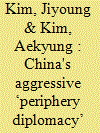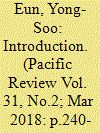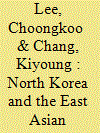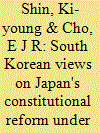|
|
|
Sort Order |
|
|
|
Items / Page
|
|
|
|
|
|
|
| Srl | Item |
| 1 |
ID:
157812


|
|
|
|
|
| Summary/Abstract |
Over the last two decades, China has experienced one of the most dramatic and sustained periods of economic growth in world history. China's use of economic statecraft provides an important venue in which to examine the role of unacknowledged ‘coercive diplomacy’ within the context of China's ‘peaceful rise discourse.’ In contrast to Western countries, which have overtly used sanctions and other forms of economic coercion, China has publicly denied any such policies while at the same time quietly pursuing them. China's denial of using coercive economic statecraft has muted the reactions of neighboring publics and government, but it cannot entirely forestall them. Without seriously undermining China's ‘peaceful-rising’ image, a more explicit statement from Beijing regarding its coercive economic measure could provide deterrence and assurance to China's neighbors in resolving the disputes. This article first surveys existing literature on economic statecraft focusing on the coercive aspects of such strategies. Second, it presents an in-depth case study on how China uses economic leverages over its neighbors in East Asia: North Korea, Japan, and the Philippines. Finally, it highlights the limits of China's economic statecraft within the constraints of China's ‘peaceful rise’ discourse. It concludes with implications for Asian politics and beyond.
|
|
|
|
|
|
|
|
|
|
|
|
|
|
|
|
| 2 |
ID:
157819


|
|
|
|
|
| Summary/Abstract |
In this special section, the present article reviews South Korean perspectives on China's ‘periphery diplomacy’ with a focus on Chinese behaviour with respect to the East China Sea maritime territory and the Asian Infrastructure Investment Bank (AIIB). By analysing research papers published by various Korean research institutions and academic journals, this article demonstrates that most Korean scholars hold that as long as China's growth goes on, the tensions between the US and China are likely to intensify. The article also shows that one of the primary concerns of South Korean scholars lies in the question of how South Korea should respond to changing regional orders and a rising China. The article argues that South Korea's strategic dilemma is reflected in a regional structure in which competition between two great powers has recently forced the periphery to impose bilateral ties on.
|
|
|
|
|
|
|
|
|
|
|
|
|
|
|
|
| 3 |
ID:
157813


|
|
|
|
|
| Summary/Abstract |
The article looks at China's strategic debate and confusion over the South China Sea (SCS) issue and explores why it has occurred. This article recognizes that China has not yet decided whether the SCS issue should be included among China's core national interests. Additionally, China has not quite figured out whether the priorities should be placed on the SCS claims or the Sino-US relationship. In addition, China has not worked out exactly what the Nine-Dash Line (NDL) means. It contends that identity is a key factor in informing a state's strategic concerns and policy objectives regarding the SCS. This article argues that China's dual identities force China to strike a middle ground, which causes domestic strategic debate and confusion. In the final analysis, this article tries to determine what salient implications a prevailing identity of China as a rising power would yield for its SCS policies.
|
|
|
|
|
|
|
|
|
|
|
|
|
|
|
|
| 4 |
ID:
157810


|
|
|
|
|
| Summary/Abstract |
Why does Indonesia, whose regional leadership would seem to flow so obviously from its material and normative footprint, and whose role as primus inter pares is readily, if sometimes grudgingly, acknowledged by its peers, struggle to translate that position into an unambiguous, consistent, and effective regional presence? While there are many possible answers to this question, this article focuses on societal interpretations, arguing that such a role is exercised not in a vacuum, susceptible to measurement against a set of fixed criteria, but in the context of its respective region's unique and constantly evolving profile. Drawing on the English School's concept of institutions, and focusing on three areas within the ASEAN Socio-Cultural Community (migration, disaster preparedness, and the environment), the article argues that the paradox of Indonesia's powerful-but-not-powerful position reflects the kind of ‘great-power management’ that is to be expected in the restrictive context of regional international society, and is profoundly influenced by the uneven interplay of institutions embedded at different levels in the regional experience.
|
|
|
|
|
|
|
|
|
|
|
|
|
|
|
|
| 5 |
ID:
157816


|
|
|
|
|
| Summary/Abstract |
This opening article presents rationales for the Special Section which analyses South Korea's debates and discourses on crucial issues related to East Asian regional politics. The article opens with a consideration of why attention is drawn to South Korea and particularly to its discourses. Expanding upon constructivist theoretical insights, this article shows how they matter in foreign policy-making and state behaviour. In addition, the article clarifies the scope of analysis of this Special Section. While recognising that many different actors and issues shape the regional order in East Asia to varying degrees, we hold that the most direct impact on changes and/or continuity in that order comes from state actors in the realm of security (or the security–economy nexus). The article ends on a cautiously optimistic note: although the perspectives and discourses analysed in this Special Section are not exhaustive, the analysis can serve as a useful reference point for discussion that seeks to advance our understandings of how South Korea is likely to behave toward its neighbours and what the future of the East Asian regional order will look like.
|
|
|
|
|
|
|
|
|
|
|
|
|
|
|
|
| 6 |
ID:
157815


|
|
|
|
|
| Summary/Abstract |
This paper explores the middle power identities of Australia and South Korea during the Kevin Rudd/Julia Gillard (2007–2013) and Lee Myung-bak (2008–2013) administrations. Considering the problems in the existing position, behaviour, impact and identity-based definitions of middle powers, examining how self-identified middle powers have constructed such an identity would offer useful insights into the middle power concept. Relying on a framework that captures an identity's content and contestation, this paper argues that while Australia and South Korea have assumed a middle power identity, their visualisations of this identity are slightly different. Australia has understood its middle power identity in both economic and security terms, whereas South Korea appears to have connected such an identity more with the economic dimension. These differences affect how they envision their respective middle power roles in international affairs.
|
|
|
|
|
|
|
|
|
|
|
|
|
|
|
|
| 7 |
ID:
157817


|
|
|
|
|
| Summary/Abstract |
This article investigates South Korean views on how to deal with the two major security issues regarding North Korea: its nuclear threat and regime instability. In this Special Section, the article analyzes the ongoing debate in South Korea over the government's policy toward North Korea in regard to these two issues. It argues that uncertainties about these two major issues are shaping the regional order in East Asia. In particular, the different levels of cooperation between South Korea and the United States may affect the regional security order in East Asia. In analyzing policy options available to South Korea, the riskiest option would be to employ early preemptive attacks and accelerate the collapse of North Korea given the security dilemma-driven action‒reaction in East Asia. Given that the role of China has become the most crucial factor in dealing with North Korea, the most promising strategy would be to reinforce guarantees of extended nuclear deterrence and prompt a soft-landing unification.
|
|
|
|
|
|
|
|
|
|
|
|
|
|
|
|
| 8 |
ID:
157818


|
|
|
|
|
| Summary/Abstract |
In this Special Section, this article reviews South Korean views on Japan's ‘peace’ Constitution and the Abe government's attempts at constitutional reform. It identifies three different understandings among South Korean academics on why Japan is escalating attempts to revise the Constitution under the Abe government. An in-depth analysis demonstrates that all three perspectives pay specific attention to Japan's constitutional reform in relation to security policy changes. However, they differ in assessing the impact of Japan's constitutional reform on South Korea as well as how South Korea should deal with such a change. A minority opinion considers Japan's ‘remilitarisation’ through constitutional revision as conducive to South Korean security interests by increasing deterrence against North Korea, whereas the dominant opinion is that any attempt to revise the Constitution could be in and of itself a potential threat to South Korea's security due to a lack of trust attributed to unresolved historical conflicts between Korea and Japan. However, all three approaches pay hardly any attention to the positive role of Japan's peace Constitution while Japan's peace Constitution might provide a regional peace model in Northeast Asia.
|
|
|
|
|
|
|
|
|
|
|
|
|
|
|
|
| 9 |
ID:
157811


|
|
|
|
|
| Summary/Abstract |
Vying for high-speed railway projects overseas has become a prominent feature of China's diplomacy in recent years, including in Southeast Asia. These efforts have been widely depicted within the premises of the China Threat narrative – as a part of Beijing's agenda to alter the power balance in Southeast Asia at the expense of the economic, political, and security well-being of countries in the region. This paper challenges such interpretations and concludes that these projects do not have either the intention or capacity to facilitate such a hostile and far-reaching agenda toward the region.
|
|
|
|
|
|
|
|
|
|
|
|
|
|
|
|
| 10 |
ID:
157814


|
|
|
|
|
| Summary/Abstract |
Vietnam's perception of China is nuanced and complex, a mixture of challenge and opportunity. Given its geographic proximity and overwhelming power, China represents a permanent strategic challenge Vietnam cannot escape. However, the two countries are partners in the defence of socialist ideals and communist rule. These circumstances have clearly shaped Vietnam's China policy, which is a mixture of cooperation and struggle. Vietnam's strategy is not about confronting China directly but finding a way to live with and benefit from its power.
|
|
|
|
|
|
|
|
|
|
|
|
|
|
|
|
|
|
|
|
|